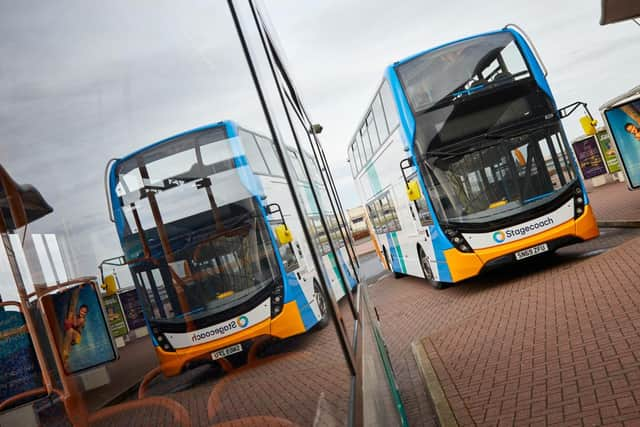Transport giant Stagecoach changes route, opting for £595m takeover and putting brakes on proposed National Express merger
Stagecoach said it is recommending an acquisition by German investment group DWS Infrastructure for 105p a share in cash and has withdrawn support for the National Express bid, which valued Stagecoach at around £437m.
The National Express and Stagecoach tie-up, which was agreed in December, is being investigated by the Competition and Markets Authority (CMA), which served a so-called initial enforcement order in January stopping the firms from combining operations or selling any UK businesses while it probes the deal.


Advertisement
Hide AdAdvertisement
Hide AdStagecoach said the DWS bid offers greater certainty for investors and employees, with only a "very small" number of head office staff set to be affected and no changes expected to frontline workers and drivers. It will also keep its headquarters in Perth under the deal.
Martin Griffiths, chief executive of Stagecoach, said: "The proposed offer presents a major opportunity to maximise the significant growth potential ahead… We believe it will open a new and exciting chapter for Stagecoach, backed by a team who share our vision for a more sustainable future."
He later said the deal was "positive for employees and creates more certainty", adding that it would have been a "long and quite arduous process" with the CMA on the National Express deal.
The offer from DWS marks a 37 per cent premium to Stagecoach's closing share price of 76.55p on Tuesday. The National Express offer was worth just over 69.34p a share, and would have given Stagecoach's shareholders a 25 per cent stake in the enlarged business. It would also see National Express chief executive Ignacio Garat taking the driving seat within the merged firm.
However, around 50 roles were expected to be cut under that proposed merger, across the head offices, IT and corporate departments of the two firms, as well as some overlapping senior management positions, while the head office was set to move from Perth to Birmingham.
National Express has called on investors to "take no action" and said it would make a further announcement in due course.
DWS already has various long-term infrastructure investments in the UK, such as Yorkshire Water owner Kelda and Peel Ports, as well as in other European transport groups, including Belgian public bus operator Hansea.
Routes to growth
Hamish Mackenzie, head of infrastructure at DWS, said: "As a long-term investor in essential services with a strong track record in the UK and European transport sectors, DWS Infrastructure will back Stagecoach to rapidly capitalise on the growth opportunities presented by increased public and private investment in UK bus and coach."
Advertisement
Hide AdAdvertisement
Hide AdJefferies analyst Becky Lane said: "Stagecoach's new offer is materially higher than National Express', despite limited synergies. We thought the National Express merger was financially attractive, but share price performance suggests investors may have needed more convincing strategically."
Sir Brian Souter – who now has Souter Investments, his private family investment office – along with his sister, philanthropist Dame Ann Gloag, founded Stagecoach in 1980.
The group, which has become one of the biggest operators of bus routes across the UK, last week said it was on course to meet its trading expectations for the year ending April 30.
A message from the Editor:
Thank you for reading this article. We're more reliant on your support than ever as the shift in consumer habits brought about by coronavirus impacts our advertisers.
If you haven't already, please consider supporting our trusted, fact-checked journalism by taking out a digital subscription.
Comments
Want to join the conversation? Please or to comment on this article.
